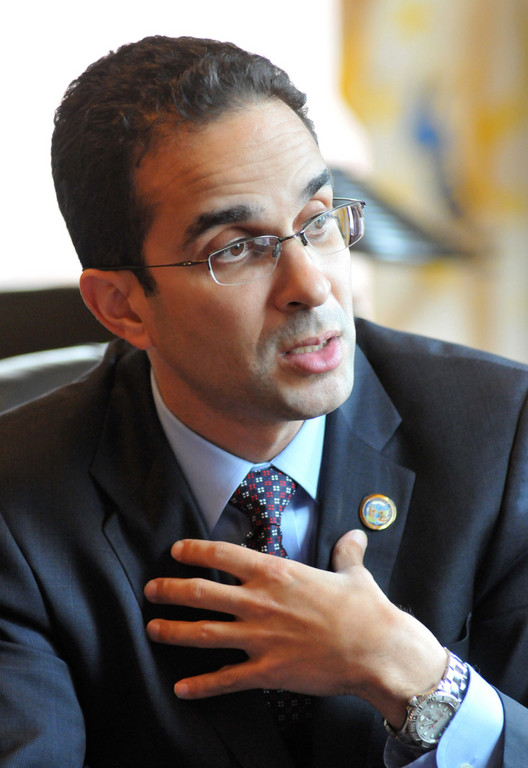
Providence Mayor Angel Taveras took office a little more than a year ago facing a budget crisis so serious it took a financial-panel investigation to peg it at $110 million, one of the worst in the city’s history. Since then, Taveras closed four schools, raised taxes, negotiated union concessions and chopped $24 million from the budget, but is still looking at a deficit of $15 million to $20 million for the current fiscal year.
To close at least part of that gap, Taveras has waged a public campaign to extract larger contributions from the city’s nonprofit colleges and hospitals, a campaign that recently turned confrontational. He is also at the forefront of a push for legislative relief for the underfunded pension plans plaguing the city and other communities.
PBN: So far you haven’t had much success getting more money from local nonprofits. Aside from asking them, is there anything you can do to make Providence’s colleges and hospitals contribute more?
TAVERAS: I think that the most important thing I can do is be straight with the people of Providence and the people of Rhode Island and let them know exactly the situation the city is facing. Let them know that we have had our unions sacrifice. We have had our students sacrifice. We have had to close schools. We’ve cut services and cut city government. We had a city budget that was smaller this year than it was last year in actual dollars. So I am going to keep telling the truth and making sure people understand the situation the city is facing and reminding that to whom much is given, much is expected. That particularly applies to the tax-exempt institutions that have had tremendous benefit from their tax exemption. I think it is time for them to do more.
PBN: Were you taken aback by Brown University declining the agreement that was reached? How exactly did that unravel?
TAVERAS: Let me just say that I was disappointed with the fact that the Brown Corporation never approved the agreement. And perhaps they need to learn a little bit more about what goes on in the rest of the city of Providence. We worked very hard to reach an agreement with Brown and in fact did reach a tentative agreement that would have had to go to the [Brown Corporation] and City Council. It is very disappointing. … We are codependent and need each other. … I know the city of Providence realizes it; I am not sure that Brown does.
TAVERAS: If we don’t have the tax-exempts do their fair share of the sacrifice now, it won’t be the next budget cycle before people realize that we will have to make very difficult decisions. It will be the current fiscal year. That is $7.1 million we are counting on to balance our budget. If we are not able to obtain that from our tax-exempt entities, then we only have two choices: further cuts in services, and I am not sure there are too many places we can cut. And the other is a supplemental tax increase, which is not something that anyone wants to think about. But I don’t have many choices here.
PBN: During the recent state pension-overhaul debate lawmakers cut cost-of-living-increase relief for municipally run plans from the reform bill out of concern it wouldn’t withstand legal challenge. Do you accept that premise?
TAVERAS: What I wanted with respect to the legislation, I said for it to be comprehensive, it had to address the cities and towns and the municipally run pensions. You can’t be healthy when you have 24 out of 36 municipally run plans in critical status. What I advocated for was enabling legislation that essentially would allow cities and towns to decide whether they were in a position to suspend COLAs. It is similar to legislation that was passed by the General Assembly regarding Medicare and being able to move retirees once they hit 65 into Medicare. We took action in the city, and we have been sued by retirees relative to Medicare and are defending that in court. I thought it was important to have the same tool relative to COLAs. In the city of Providence that is very important, because our COLAs represent $16.5 million of $58.9 million we are spending on pensions this year. The overwhelming majority of that is for retirees.
PBN: So why wouldn’t that be part of the negotiations with the unions?
TAVERAS: If in fact the retirees were represented by the union, you could negotiate with the union and reach some kind of agreement. The law in Rhode Island is that the unions do not represent the retirees and that is our biggest problem. The current employees have given a lot. You need the legal entity to collectively represent the 2,900 retirees we have.
TAVERAS: On a personal level, closing schools was the most difficult thing I have had to do. Sitting through the school-closure hearings, and I attended four of them, was excruciating and the frustration and emotion, pain that was evident was very difficult. To have children ask you about closing their school is very difficult. To have a young kindergartner say she would not forget what you did when she grew up is very difficult.
PBN: Will you pursue any of the recommendations in the recent revenue-commission report, including lowering the commercial tax rate and raising the meals tax?
TAVERAS: We are still reviewing the report, and it is obviously complex, because when you change one rate it affects others and affects your ability to raise the revenue needed to run the city. I am obviously supportive of their recommendation regarding tax-exempt institutions, but it is a huge challenge for us. We have to make sure we raise enough revenue to run the city but at the same time be competitive with other cities and towns across the region.
PBN: There has been a lot of concern about the “Superman” building at 111 Westminster St. becoming vacant a year from now when Bank of America’s lease expires. You can see it from your window; is there anything you can do to try to make sure it doesn’t become vacant?
TAVERAS: Economic Development Director Jim Bennett has been focused on this issue because I have made it a priority for him and us as a city. We are doing everything we can to make sure that does not happen. I have reached out to [Bank of America Rhode Island Market President William F.] Hatfield and [Bank of America CEO] Brian T. Moynihan regarding this, and I look forward to speaking with them shortly and trying to see what we can do to make it more attractive to keep the anchor tenant there, even if it is not the whole building. •











